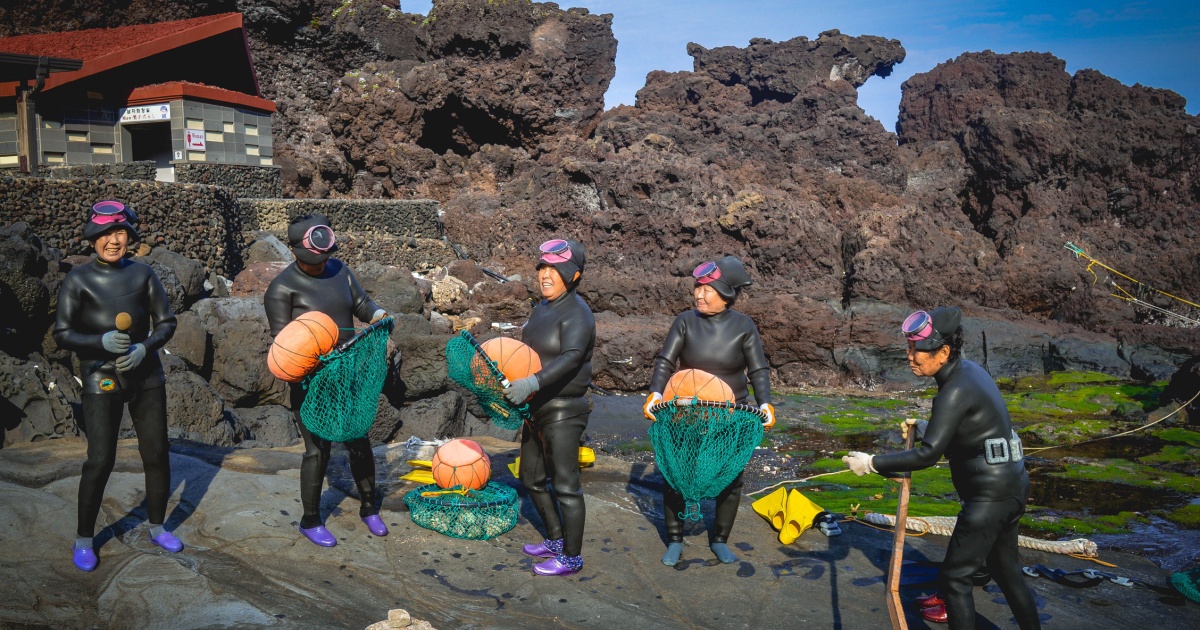
shutterstock
Populations of people have survived throughout history largely from nearby bodies of water. Fishing could provide a great source of food, and the water can also be used for travel. Of course, having a large lake or ocean nearby can also impact the weather in many favorable ways and provide reliable access to drinkable water.
According to a new study published in the journal Cell Reports, some groups of people even evolved specifically based on the way that they interacted with the water in their region. The study looked at a group of women known as The Haenyeo, which translates to “Sea Women.” They, and their ancestors for generations, lived on Jeju Island in South Korea and are known for diving deep into the cold water of the area to catch seaweed, octopus, sea urchins, and other sea life to help them survive.
In their culture, it is only the women who engage in this activity, and they are able to routinely dive down 10 meters (33 feet) under the ocean without any breathing equipment. The typical dive lasts just 30 seconds, but they will go up and down repeatedly for 4-5 hours at a time, which requires incredible endurance. This tradition has been going on for generations, so researchers at the University of California, Berkeley wanted to look at what, if any, genetic changes they might have experienced.
So, they worked with 30 Haenyeo divers as well as 30 non-diving women from the island. In addition, they had 31 people from the mainland to help serve as a control group.

Shutterstock
The study found that the Haenyeo had several gene variations that are believed to help them become more successful divers. Perhaps the most important gene is one that is commonly linked to cold tolerance, allowing them to dive longer and in colder water without experiencing hypothermia. Another gene is linked to lower diastolic blood pressure, which is important for this type of diving. The gene variations mentioned were found in 33% of the Jeju population compared to just 7% of mainland Korea.
Melissa Ilardo is a geneticist at the University of Utah and one of the study authors. She put out a statement on the study, saying:
“This association may reflect natural selection to mitigate the complications of diastolic hypertension experienced by female divers while diving through pregnancy. Since Bajau women also dive while they’re pregnant, we wonder whether pregnancy is actually driving a lot of the genetic changes in these diving populations.”
Another thing that the team looked at is the drop in heart rate during a dive. One might assume that while diving, your heart rate would increase due to the added stress on the body, but that is not the case. All the participants of the study had a decrease in beats per minute during a dive, which is the body’s way to conserve oxygen while underwater.
The Haenyeo had their beats per minute drop by an average of 18.8, which is quite a bit more than the average non-diving woman, who dropped by just 12.6 beats per minute. This, the authors say, is likely caused by their lifelong training rather than genetics. Ilardo commented on one particularly impressive diver, saying:
“Because the Haenyeo have been diving for a very long time, their heart rate has been trained to drop more. This was something we could actually visually see – we had one diver whose heart rate dropped by over 40 beats per minute in less than 15 seconds.”
This is a massive drop, and undoubtedly allows her to dive longer than someone whose heart continued to be closer to their normal resting heart rate.

shutterstock
This study wasn’t just to learn more about this amazing culture though, it could also help understand more about genetics and even help to come up with therapies. Ilardo explained:
“We’re really excited to learn more about how these genetic changes may be affecting the health of the broader population of Jeju. If we can more deeply characterize how those changes affect physiology, it could inspire the development of therapeutics to treat different conditions, such as hypertensive disorders of pregnancy and stroke.”
The Haenyeo divers are an incredible example of how genetics plus training can dramatically change the way the body works, helping people to adapt and evolve to survive in almost any environment.
If you thought that was interesting, you might like to read about a second giant hole has opened up on the sun’s surface. Here’s what it means.
Categories: NATURE/SPACE
Tags: · culture, divers, evolution, fishing, freediving, genetics, Haenyeo, health, ocean diving, science, single topic, south korea, top
